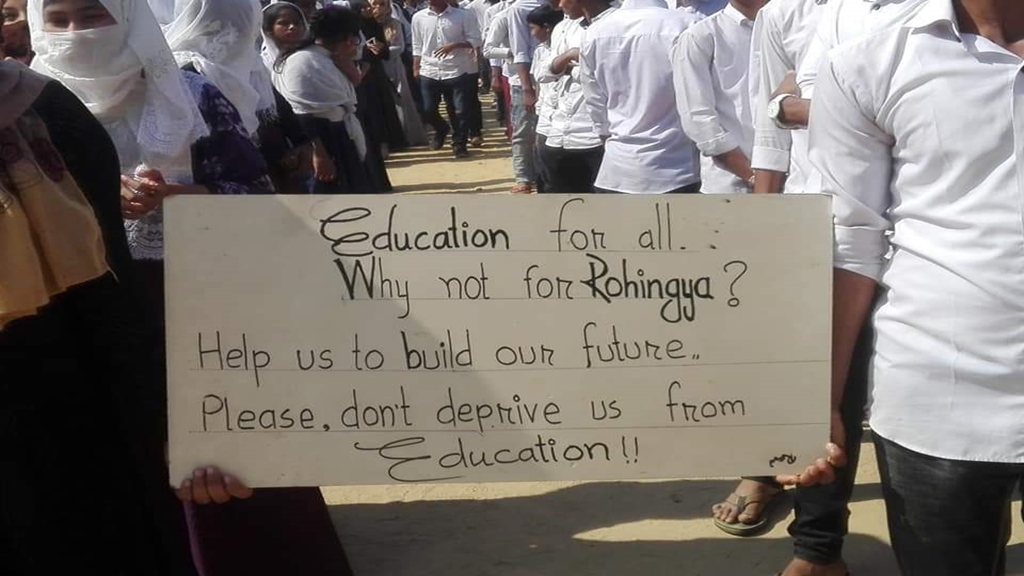
Bangladesh: Rohingya Refugee Schools Face Closure
- 18/12/2021
- 0
Tens of Thousands of Students Will Lose Access to Education
By HRW
(Bangkok) – The Bangladesh government should urgently reverse a decision to close thousands of home-based and community-led schools for Rohingya refugee students, Human Rights Watch said today. Unless the foreign minister or the disaster management minister overturns the action, approximately 30,000 children will lose their access to education.
The decision was issued on December 13, 2021 by the Refugee Relief and Repatriation Commissioner, a Bangladesh government official responsible for education policy in the refugee camps where about 400,000 school-age children are confined. Four Rohingya teachers and two community leaders confirmed the school closures, but said no rationale was provided. Humanitarian workers said they had no warning of the decision or ability to provide alternatives.
“Bangladesh’s decision to close schools for Rohingya refugee children violates the right to education on a massive scale,” said Bill Van Esveld, associate children’s rights director at Human Rights Watch. “This cruel decision should be immediately reversed so that Rohingya children can get an education, which will be especially critical for their return to Myanmar when it is safe to do so.”
The Bangladesh government saved countless lives when it opened its borders to ethnic Rohingya fleeing atrocity crimes by Myanmar’s military in August 2017. However, as part of a policy to prevent refugees from integrating in the country, the authorities barred Rohingya children’s access to public and private schools. They also severely restricted the education programs that humanitarian groups could provide inside the refugee camps in Cox’s Bazar, near the Myanmar border. Now the alternative schools inside the camps are at risk.
The government’s 19-point decision, effective immediately, states that “home-based learning center[s] will be closed.” At these centers, set up in people’s shelters, humanitarian groups supported by international donor funding provide non-formal lessons that have been approved by the Bangladesh government. Roughly 22,000 Rohingya children are currently enrolled in the home-based centers, according to humanitarian groups. Another 92,000 students attend approved non-formal lessons at small, one-story bamboo “learning centers” outside people’s homes, which teach three daily shifts of just two hours per shift, according to the United Nations refugee agency, UNHCR.
The decision also orders that “all private learning center[s] must be shut down,” referring to community-led schools established by Rohingya refugee volunteer-teachers. These schools have enrolled about 10,000 children and teach the formal Myanmar curriculum, but are not officially approved. These schools have not received any support from humanitarian donors and charge minimal if any fees to cover basic learning materials. Bangladesh camp authorities had closed one of these unauthorized schools, with more than 400 students, on October 14, a teacher at the school said. But the community-led schools are the basis of a p lan, which the Bangladesh government supports, to allow Rohingya to study the formal Myanmar curriculum.
Humanitarian workers said that the home-based schools are “essential” to access learning and psychosocial support, and that approximately 84 percent of the students are girls. They said the community-led schools are especially crucial for adolescents, who are too old to attend the officially approved lessons at the learning centers and have few other education options. Together, these schools had provided the only education accessible to Rohingya children during the 18 months when the authorities had closed learning centers as part of restrictions related to the Covid-19 pandemic, until the government partially lifted the closure on September 22.
Bangladesh authorities closed at least two community-led Rohingya schools with hundreds of students on December 13. In one camp, the assistant camp-in-charge – a Bangladesh official – and police officers arrived and closed a school with 800 students and seized all the furniture and education materials “without asking a single question,” a teacher said. The authorities also seized a teacher’s UN-issued identity document, which they have yet to return.
At a school in another camp, a teacherwith 50 students said that a Rohingya community leader, told him that the camp-in-charge had instructed community leaders, or majhis, to inform all teachers they had to stop teaching immediately. “I was surprised,” the teacher said. “These kids are at least studying, otherwise they do not have anything to do and their future would just be ruined.”
Two community leaders in different camps said that Bangladesh camp authorities had instructed them to provide lists of community-led Rohingya schools and teachers, and to instruct these teachers to close their schools. “I was instructed to make a list of private schools, and teachers teaching at those schools,” one community leader said. “[The authorities] follow up with us.”
Education staff at humanitarian groups said that officially approved learning centers could not accommodate the students forced to drop out of the home-based and community schools set to be closed. “The impact could be huge, and this decision might not leave any way for these students to integrate into Myanmar society if they are able to return,” one aid worker said.
The Bangladesh decision also orders that the Myanmar national anthem “must be played daily on each shift at every learning center.” It prohibits teaching Rohingya children “how to draw the national flag of Bangladesh, how to write and speak in Bangla, and most important, the national culture of Bangladesh.”
While the decision provides no explanation for these orders, staff at two international humanitarian agencies said that they believed the orders were related to a recent visit to a learning center by two Bangladesh officials who asked Rohingya children, “What is your country?” The children replied, “Bangladesh,” and drew pictures of Bangladesh’s flag, they said. Human Rights Watch could not independently confirm their account.
“Foreign donors and the United Nations have for more than four years quietly tried to persuade the Bangladesh government to stop blocking Rohingya children’s education,” Van Esveld said. “A stronger, more coordinated effort is needed so that Bangladesh reverses its outright harmful policy to deny education to a generation of children who have no more time to lose.”






